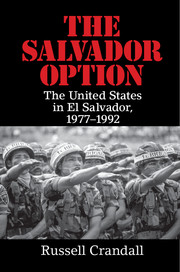Book contents
- Frontmatter
- Dedication
- Epigraph
- Contents
- List of Figures
- List of Organizations
- Acknowledgments
- 1 Introduction
- PART ONE EL SALVADOR IN THE COLD WAR
- PART TWO JIMMY CARTER
- PART THREE RONALD REAGAN
- 19 Reagan Arrives
- 20 Reagan and Salvador
- 21 El Mozote
- 22 Another Vietnam
- 23 Solidarity
- 24 Troop Cap and Certifying Human Rights
- 25 Reagan Gambles on Elections, 1982
- 26 The Shultz Doctrine
- 27 Human Rights
- 28 Henry Kissinger
- 29 Contras
- 30 “Elections Yes, Dialogue No,” 1984 Presidential Election
- 31 La Palma
- 32 Esquipulas
- 33 Counterinsurgency I
- 34 Counterinsurgency II
- 35 Zona Rosa
- 36 Air War
- 37 José Napoleón Duarte
- 38 Iran-Contra
- PART FOUR GEORGE H. W. BUSH
- PART FIVE POSTWAR
- Notes
- Bibliography
- Index
37 - José Napoleón Duarte
from PART THREE - RONALD REAGAN
Published online by Cambridge University Press: 05 June 2016
- Frontmatter
- Dedication
- Epigraph
- Contents
- List of Figures
- List of Organizations
- Acknowledgments
- 1 Introduction
- PART ONE EL SALVADOR IN THE COLD WAR
- PART TWO JIMMY CARTER
- PART THREE RONALD REAGAN
- 19 Reagan Arrives
- 20 Reagan and Salvador
- 21 El Mozote
- 22 Another Vietnam
- 23 Solidarity
- 24 Troop Cap and Certifying Human Rights
- 25 Reagan Gambles on Elections, 1982
- 26 The Shultz Doctrine
- 27 Human Rights
- 28 Henry Kissinger
- 29 Contras
- 30 “Elections Yes, Dialogue No,” 1984 Presidential Election
- 31 La Palma
- 32 Esquipulas
- 33 Counterinsurgency I
- 34 Counterinsurgency II
- 35 Zona Rosa
- 36 Air War
- 37 José Napoleón Duarte
- 38 Iran-Contra
- PART FOUR GEORGE H. W. BUSH
- PART FIVE POSTWAR
- Notes
- Bibliography
- Index
Summary
A CIA asset.
– Robert White, former U.S. ambassador to El Salvador, describing José Napoleón DuarteHis power has come not from the barrels of the gun but from the plebiscites of the people.
– Timothy O'Meara, university provost, 1985“Taken a Shine to the Kid from El Salvador”
In late 1986 the New York Review of Books published a profile of José Napoleón Duarte. It described the Salvadoran president to its American readers as “the son of a politically progressive tailor and a seamstress, a thoroughly middle-class boy.” Duarte's parents were indeed “moderately comfortable” – with the help of a lucky lottery ticket, they were able to send him and his brother to Notre Dame University in Indiana, although the future president spoke little English. The capable Duarte studied civil engineering and graduated in 1948. He returned to El Salvador, got married, and joined his father-in-law's thriving construction company. Before leaving for Notre Dame, Duarte had joined in political movements that helped overthrow the General Hernández Martínez dictatorship in 1944; a year later a military regime's ascension forced him into exile in Guatemala where he briefly worked in an opposition cell.
Duarte's first real interest in politics took off after Notre Dame when he successfully ran for mayor of San Salvador in 1964 and subsequently served two more terms. His protests against the military regime in the aftermath of the stolen 1972 elections led to his arrest at the National Police headquarters, where he suffered a smashed cheekbone, a black eye, and charges of treason. International pressure, including from Notre Dame president Reverend Theodore Hesburgh – “who had taken a shine to the kid from El Salvador” – helped ensure Duarte's exile to Venezuela. While in exile, Duarte severed three of his fingers in an industrial accident, an injury that would later be misconstrued as the work of police torturers. During his years in Venezuela, Duarte worked as a civil engineer while he “awaited the call home that was sure to come.”
“He Was Like Anwar Sadat”
Duarte's role as a moderate but decidedly anti-communist democratic reformer was essential for the evolution of El Salvador's conflict. Most critically, he influenced the international community's perception of the Salvadoran government's commitment to reform. Duarte's impeccable democratic bona fides gave him a credibility that no other Salvadoran politician could even begin to match.
- Type
- Chapter
- Information
- The Salvador OptionThe United States in El Salvador, 1977–1992, pp. 382 - 396Publisher: Cambridge University PressPrint publication year: 2016

